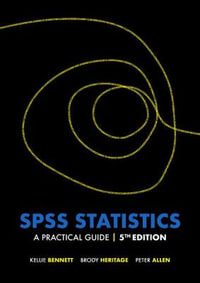One of our bestselling handbooks, The SAGE Handbook of Qualitative Research in Psychology, is back for a second edition. Since the first edition qualitative research in psychology has been transformed. Responding to this, existing chapters have been updated, and three new chapters introduced on Thematic Analysis, Interpretation and Netnography. With a focus on methodological progress throughout, the chapters are organised into three sections:
Section One: Methods
Section Two: Perspectives and Techniques
Section Three: Applications
In the field of psychology and beyond, this handbook will constitute a valuable resource for both experienced qualitative researchers and novices for many years to come.
Industry Reviews
The second edition of the SAGE Handbook of Qualitative Research is an extraordinary compendium of the central current issues in qualitative research in psychology. Capturing the diversity and plurality of qualitative methods of investigation, this updated handbook also considers matters such as ethics and reflexivity shared across methods. Newly revised to include recent work in the burgeoning field of qualitative inquiry, it will be an essential companion for both new and experienced qualitative researchers. Qualitative researchers in psychology owe a debt of gratitude to these editors for pulling this together. -- Ruthellen Josselson, Ph.D. This is a very welcome and timely second edition of the highly-regarded SAGE Handbook of Qualitative Research in Psychology. In the nine years since it was first published in 2008, qualitative research in psychology has flourished into a rich, diverse and vibrant field. As the Editors of this Handbook note, there is a sense of sophistication that has evolved throughout these recent developments. There is also an increased confidence that can be seen across this updated Handbook, from the editors' valuable framing of the field at the start through to the revised chapters and the inclusion of three new chapters. Notable additions to the Handbook include a chapter devoted to interpretation issues in qualitative research, new approaches to thematic analysis, developments and progress around metasynthesis, netnography and the implications of rapidly developing information and communication technologies for qualitative research. This Handbook will be highly valuable for a range of audiences, including for students in psychology and other social science disciplines, but also for academics, practitioners and activists (and indeed essential reading for many). It provides a comprehensive overview of the current state-of-play in qualitative research in psychology, covers a range of diverse methodologies, outlines key approaches and perspectives, and describes applications to specific subfields of psychology. It doesn't shy away from the many big questions, tensions, complexities and debates that are involved in qualitative research, including the range of positions and approaches that exist regarding epistemology, ethics and politics, and the varying priorities that different people bring to research. Rather it engages with these issues directly and in an accessible and welcoming manner, ensuring this Handbook will function as the clear and reliable guide for both novices and experienced researchers. In this sense it is highly successful in meeting its purpose to "help its readers to gain a sense of the territory and to enable them to make well-informed methodological theoretical and ideological choices" (Stainton Rogers & Willig, p4). -- Antonia Lyons The Sage Handbook of Qualitative Research in Psychology is comprehensive and bold, celebrating the wide range of methods, approaches, perspectives and applications among qualitative research in psychology. Written by leading psychologists, this handbook covers what are now well established qualitative methods while considering methodological changes required by contemporary developments, such as social media and the routine recording of people at work, blurring the distinctions between public and private and research and everyday practice. -- Peter Branney
























